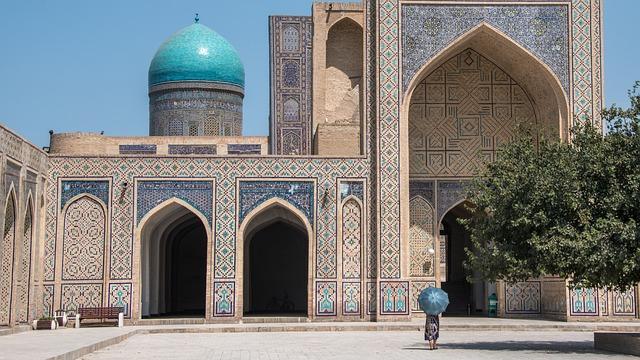In a important move poised to reshape the economic landscape of Central Asia, Uzbekistan and Turkmenistan have formally implemented a bilateral free trade agreement aimed at fostering closer economic cooperation and enhancing regional trade dynamics. Announced amid increasing globalization and the pursuit of economic diversification, this agreement seeks to reduce tariffs, streamline trade procedures, and promote investments between the two neighboring nations. With their rich resource bases and strategic geographic locations, Uzbekistan and turkmenistan stand to bolster their economic growth while strengthening political ties. This development not only reflects a commitment to regional integration but also underscores the importance of collaborative efforts in a rapidly evolving global economy. As the two countries embark on this new chapter, their partnership may serve as a model for other Central Asian states aiming to harness the benefits of free trade and cooperation.
impact of the Free Trade Agreement on Regional Economic Dynamics
The implementation of the Free Trade Agreement (FTA) between Uzbekistan and Turkmenistan is set to reshape the economic landscape of both nations, driving growth and enhancing bilateral trade. This agreement is expected to lower tariffs and streamline customs procedures, fostering an environment that encourages business investment and trade expansion.Consequently, industries such as textiles, agriculture, and energy could see accelerated development, leading to increased productivity and innovation across sectors. The FTA aims to enhance regional cooperation by establishing a framework that promotes systematic trade flows and economic interdependence.
Furthermore, the agreement could positively influence consumer markets by providing wider access to goods and services at competitive prices. A key aspect of the FTA is its ability to stimulate job creation through increased export opportunities and new market entrants. The integration of economies may also lead to the development of joint ventures and partnerships, optimizing resource allocation and sharing of expertise. In terms of regional dynamics, other Central Asian nations may feel pressured to evaluate their trade policies and look for ways to enhance their own economic relations, potentially transforming the entire region’s trade landscape.
| Key Benefits | Impact |
|---|---|
| Lower tariffs | Reduced prices for consumers and businesses |
| Increased Trade Volume | Enhanced market opportunities |
| Job Creation | Lower unemployment rates and economic growth |
| Resource Optimization | Improved efficiency in production and distribution |

Key Sectors Benefiting from Uzbekistan-Turkmenistan Trade Collaboration
The newly implemented free trade agreement between uzbekistan and Turkmenistan stands to significantly boost various sectors of both economies. Key industries are already poised to take advantage of this collaboration, notably in areas such as:
- Agriculture: Enhanced cooperation will facilitate the exchange of agricultural products, helping both countries meet their food security objectives while also tapping into new markets.
- Textiles: The textile sector is expected to thrive as trade barriers lower, allowing for the seamless flow of raw materials and finished goods between the two nations.
- Energy: The agreement places a strong emphasis on joint energy projects, especially in natural gas and renewable energy, further diversifying energy sources for both countries.
- Tourism: With reduced tariffs and improved connectivity, the tourism sector will likely flourish, attracting visitors keen to explore the rich cultural heritages of both nations.
in addition to these primary sectors, the technological and manufacturing industries are set to gain momentum, as collaborative initiatives inspire innovation and efficiency. Potential collaborative ventures may include:
| Sector | Impact |
|---|---|
| Information Technology | sharing expertise and resources to enhance digital infrastructure. |
| Construction | Joint projects for infrastructure development, improving regional connectivity. |
By capitalizing on their complementary strengths, both Uzbekistan and Turkmenistan are positioned to create a synergistic economic environment that fosters growth, innovation, and mutual prosperity.

challenges Ahead: Navigating Trade Barriers and Regulatory Hurdles
The recent implementation of the free trade agreement between Uzbekistan and Turkmenistan promises significant economic benefits. However, both nations must navigate a myriad of challenges to ensure the anticipated advantages are realized.Key obstacles include:
- Trade Barriers: Despite the agreement, tariffs on various goods may still pose challenges, impacting competitiveness in the regional market.
- Logistical Issues: Supply chain inefficiencies can disrupt the flow of goods, leading to increased costs and delivery delays.
- Market access: Ensuring that both countries have smooth access to each other’s markets is crucial; bureaucratic red tape could hinder this process.
Moreover,regulatory hurdles may further complicate the landscape of bilateral trade. Ensuring that both economies adhere to compatible standards and regulations is essential for seamless collaboration. Some specific areas of concern include:
- Customs Procedures: Streamlining customs processes to reduce waiting times at borders remains a priority for both countries.
- Legal Frameworks: Harmonizing laws governing trade and investment will require careful negotiation and might take time to implement effectively.
- Cultural differences: Understanding and respecting each other’s business practices and traditions may aid in smoother transactions.

Recommendations for Strengthening bilateral Economic Ties
To maximize the benefits of the recently implemented free Trade Agreement, both nations should focus on nurturing a robust framework that fosters frequent dialogues and collaborative ventures. Establishing regular bilateral business forums would allow entrepreneurs from Uzbekistan and Turkmenistan to explore common interests, share insights, and identify sectors ripe for investment. Such initiatives can be further enhanced by:
- Creating joint chambers of commerce: Facilitate networking between businesses from both countries.
- Streamlining customs procedures: Ensure smoother trade flows and reduce delays.
- Encouraging trade missions: Support delegations to explore market opportunities in each country.
Investment in infrastructure development is another cornerstone that can significantly enhance economic relations. Collaborative projects, particularly in transportation and energy, can lead to a more integrated market, benefiting both nations. The following areas present promising opportunities for joint ventures:
| Sector | Opportunity |
|---|---|
| Energy | Joint development of renewable energy projects to boost lasting growth. |
| Transportation | Enhancement of road and rail connectivity to facilitate trade routes. |
| agriculture | Collaborative research in improving crop yields through technology sharing. |

Future Prospects: The Role of Regional cooperation in Trade growth
the unfolding collaboration between Uzbekistan and Turkmenistan promises to reshape the regional landscape of trade, providing a robust framework for economic growth. As both countries implement their Free Trade Agreement, the potential for enhanced bilateral trade is poised to materialize. Analysts speculate on a multifold increase in trade volumes,impacted by the alleviation of customs tariffs and the establishment of streamlined regulatory processes. This synergy not only aims to bolster domestic industries but also encourages foreign investment, fostering a competitive marketplace that could serve as a catalyst for broader regional prosperity.
Moreover, this cooperative effort sets a precedent for other Central Asian nations, positioning them to envision a future characterized by heightened connectivity. By prioritizing joint infrastructure projects such as transportation corridors and logistics hubs, Uzbekistan and Turkmenistan can create an integrated economic ecosystem. Some anticipated benefits include:
- Increased market access to neighboring countries
- Reduction in trade barriers, enhancing competitiveness
- Improved supply chains due to shared resources and networks
- Stimulation of local economies through job creation
This partnership is more than a trade agreement; it symbolizes a evolving strategy focused on harnessing regional strengths to confront common challenges, thus inspiring prospects for a sustainable economic future.

Opportunities for Businesses: Exploring new Markets in Central Asia
The recent implementation of a free trade agreement between Uzbekistan and Turkmenistan has opened the door for businesses to explore promising opportunities in Central Asia. This landmark pact not only reduces tariffs on a range of goods but also facilitates smoother trade procedures, enhancing market access for companies operating in or targeting this dynamic region. As both nations aim to diversify their economies and attract foreign investment, businesses can benefit from the following advantages:
- Elimination of Tariffs: Significant reductions or abolishment of tariffs on various import and export items.
- Increased Market Access: easier entry into both Uzbekistan and Turkmenistan for products and services.
- Collaborative Opportunities: Potential partnerships with local companies to tap into each other’s resources and expertise.
- Investment Incentives: Government support and incentives for foreign businesses looking to establish themselves in the region.
As businesses eye these new opportunities, certain sectors are poised for rapid growth and greater demand. Key areas include agriculture, energy, and tourism, driven by the region’s rich natural resources and cultural heritage. To better understand the potential, consider the following table outlining promising industries and their respective benefits:
| Industry | Benefits |
|---|---|
| Agriculture | High demand for modern farming techniques and sustainable practices. |
| Energy | Opportunities in oil, gas, and renewable energy sectors. |
| Tourism | Growing interest in cultural tourism and eco-tourism initiatives. |

Closing Remarks
the implementation of the free trade agreement between Uzbekistan and Turkmenistan marks a significant step towards enhancing economic cooperation and regional integration in Central Asia. This agreement not only aims to reduce tariffs and streamline trade processes but also fosters stronger bilateral relationships and promotes mutual growth.As both nations move forward with this initiative, the potential for increased trade volume and investment opportunities could pave the way for broader economic stability in the region. Stakeholders from various sectors should monitor the developments closely, as the success of this agreement may serve as a model for future collaborations among Central Asian countries. The continued focus on trade liberalization and strategic partnerships underscores the importance of cooperative economic frameworks in achieving sustainable development goals in the region.

















